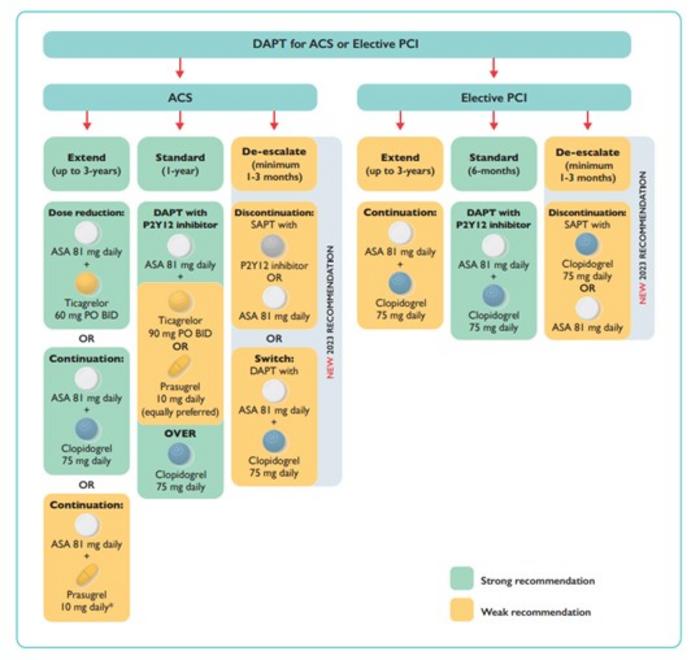Philadelphia, December 14, 2023 – The updated Canadian Cardiovascular Society (CCS)/Canadian Association of Interventional Cardiology (CAIC) antiplatelet therapy guidelines for primary and secondary prevention of atherosclerotic cardiovascular disease (ASCVD) provide recommendations based on the latest randomized evidence available in the literature. Updated by a panel of national experts, these new evidence-based guidelines appear in the Canadian Journal of Cardiology, published by Elsevier.

Credit: Canadian Journal of Cardiology
Philadelphia, December 14, 2023 – The updated Canadian Cardiovascular Society (CCS)/Canadian Association of Interventional Cardiology (CAIC) antiplatelet therapy guidelines for primary and secondary prevention of atherosclerotic cardiovascular disease (ASCVD) provide recommendations based on the latest randomized evidence available in the literature. Updated by a panel of national experts, these new evidence-based guidelines appear in the Canadian Journal of Cardiology, published by Elsevier.
ASCVD, also known as ischemic heart disease (coronary artery disease), is the buildup of plaque in the heart’s arteries that can lead to death from a heart attack or sudden cardiac death. It is the second leading cause of death in Canada, according to Health Canada. Antiplatelet medications prevent the formation of blood clots following a heart attack and/or following a stent procedure or open-heart bypass surgery.
Co-chair and first author of the guidelines, Kevin Bainey, MD, MSc, Mazankowski Alberta Heart Institute, University of Alberta, explains: “Historically, doctors recommended taking aspirin daily for primary prevention for individuals over 50 years old (‘An aspirin a day keeps the doctor away.’), but routine use is now no longer advised. Recent evidence shows the bleeding risk outweighs the benefits, questioning the routine use to prevent a heart attack, particularly in individuals who have never had a heart attack – called primary prevention. We now recommend against routine use of aspirin for primary prevention.”
Dr. Bainey notes, “However, daily aspirin could be used for people with high risk factors for heart attack — a family history of premature coronary artery disease, diabetes, high cholesterol, high blood pressure, and smoking. The 10% risk reduction is consistent in the literature. However, we also need to recognize that bleeding can be bad. The key is to talk to your doctor to decide what’s best for you. The guidelines include a new decision-aid tool to guide those conversations in an evidence-based format.
“We really focus on individuals and determining their cardiovascular risk, their risk of bleeding, and then tailoring their antiplatelet therapy to maximize the outcomes for them. So, it’s really taking it to a different level; we’re the first in the world to endorse a shared decision-making model, engaging the person who is at risk together with their doctor.”
Dr. Bainey had this very conversation with his own father who has not had a heart attack, but has diabetes, high cholesterol, high blood pressure, and a low risk of bleeding. His dad is now taking an antiplatelet to address those risk factors.
These updated national guidelines give people who are at risk and their healthcare providers access to the latest scientific findings, which have changed considerably since the last time the guidelines were published in 2018. While the daily aspirin question is likely the most controversial topic tackled by the new guidelines, most of the topics in the guidelines focus on secondary prevention, for people who have already developed ASCVD and want to avoid further damage to their hearts.
The guidelines focus on the following key topics:
- Potential role of aspirin therapy for primary prevention of cardiovascular disease
- Recommendations for shorter duration of dual antiplatelet therapy following percutaneous coronary intervention (PCI) recognizing bleeding risk, a minimally invasive procedure to open a blocked artery
- Standards for extending therapy as well as de-escalating therapy in appropriate patients
- Recommendations for the use of potent P2 Y12 inhibitors (super antiplatelets) in dual antiplatelet therapy
- Focus on patients with heart attacks who are medically managed without stents or open heart surgery
- Discontinuation of antiplatelet therapy prior to coronary artery bypass grafting (CABG) surgery and its use following CABG surgery for bypass graft protection
- Importance of minimizing antithrombotic therapy in those requiring other blood thinners (oral anticoagulation for atrial fibrillation) in the context of antiplatelet therapy
The guidelines include simple illustrative diagrams and algorithms to help healthcare providers navigate through clinical scenarios for antiplatelet management.
Dr. Bainey elaborates, “It is important for us to provide clinicians with the most up-to-date contemporary evidence to improve patient care and outcomes. We are confident that these recommendations are cutting edge and contemporary, which ultimately leads to improved health and survival not only for our cardiovascular patients in Canada, but also globally.”
The updated guidelines were released in October 2023 during the CCS scientific program of Vascular 2023.
Journal
Canadian Journal of Cardiology
DOI
10.1016/j.cjca.2023.10.013
Method of Research
Systematic review
Subject of Research
People
Article Title
2023 Canadian Cardiovascular Society/Canadian Association of Interventional Cardiology Focused Update of the Guidelines for the Use of Antiplatelet Therapy




